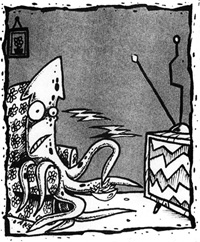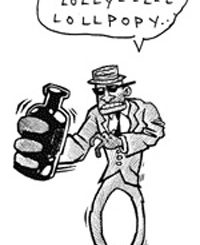 The Beast
The Beast
by Kerry Joyce
Illustration by Ans Purins
The Beast is a made-for-TV movie about a giant squid, based on Peter Benchley’s novel of the same name, which was based on another novel, one about a giant shark, also by Peter Benchley, called Jaws.
The Beast is an enormous, multi-limbed creature with a ravenous and insatiable appetite. Its grasping tentacles, equipped with suction cups, capture, encircle and then slowly squeeze the life out of the weak and unwary, increment by minute increment.
The Beast is also a made-for-TV movie called No One Would Tell, about a high school girl who is physically abused and ultimately murdered by her boyfriend. It stars Fred Savage, former frustrated cherub from the Blunder Years. In it, Fred desperately demonstrates his “acting range” in the vain hope of exorcising the typecast demon endured by most child stars, and avoiding the cruel fate of becoming an Eddie Munster for the ’90s.
This is a movie with a moral: It’s wrong to kill your girlfriend, or even hit her, even if you love her more than anything in the world and she dumps you. If you missed the moral as you watched titillated the once pre-pubescent angel Savage as a winsomely murderous, post-pubescent psychotic, and even if you didn’t notice all the victim’s tragically arranged bruises because you were too busy watching your aquarium fish during Candace Cameron’s many gratuitous shower scenes, in the finale, there was Sally Jessy Raphael, as the sentencing judge explaining the moral with an emphasizing gavel in the final scene. And if you still hadn’t gotten it, and still thought this was only a movie, there were a half-dozen or so “news teases” during the commercial breaks advertising true stories on the very same subject to be aired right after the movie on the local news; a file footage segue from entertainment to infotainment.
Well, not right after. A couple of other useless stories and a million or so commercials would be aired first. Still, if you endured, you would then know with utter certainty that violence is bad, that “Coke is it,” that “Lender’s bagels are fresh because they’re frozen,” and most importantly, that “nothing works like a Chevy truck.” If you did get the moral but just couldn’t resist being reminded of it over, and over, and over again, because it makes you feel good or superior, or something, The Beast lays in wait for you, too.
The Beast is life imitating life in a million living rooms at once. It’s archetype in stereo, a fun-house mirror of society. The Beast will reach its apex on a television show called Cops on the day that show broadcasts people getting arrested for drugs in their own living room while watching other people getting arrested for drugs in their own living room on a segment of the self same show.
The Beast is dedicated to the proposition that the human race is so profoundly stupid and irrational that the only options are to exploit the billowing bales of bovine fodder or succumb to them. But The Beast is also so deluded it actually can’t help feeding and feeding, even on itself.
The Beast is the anti-Christ one minute and Jesus the next. It assumes any form at any time so long as its transfixes, and so long as its sociological seismographs never register too many people getting to the point where their mad as hell and aren’t going to take it anymore. The Beast feels most satisfied and nourished when a cliché spouting shill, called a TV critic, judges one of its many guises to be “riveting.”
The Beast is a parasite. It debilitates without actually killing. It attracts and distracts. It cajoles, it warns, it admonishes, and insults, just like the murderous boyfriend in No One Would Tell. The Beast makes lots of promises it can’t keep, but it never promises to ever willingly leave you the hell alone. It is a master of the only form of abuse it never warns you about – the daily, delusioning network fare that strengthens, and sustains The Beast.



